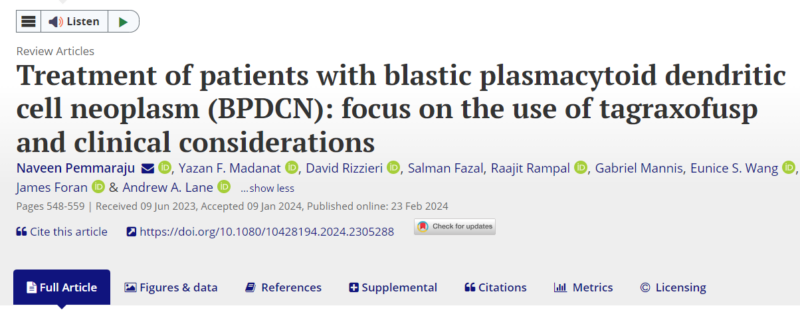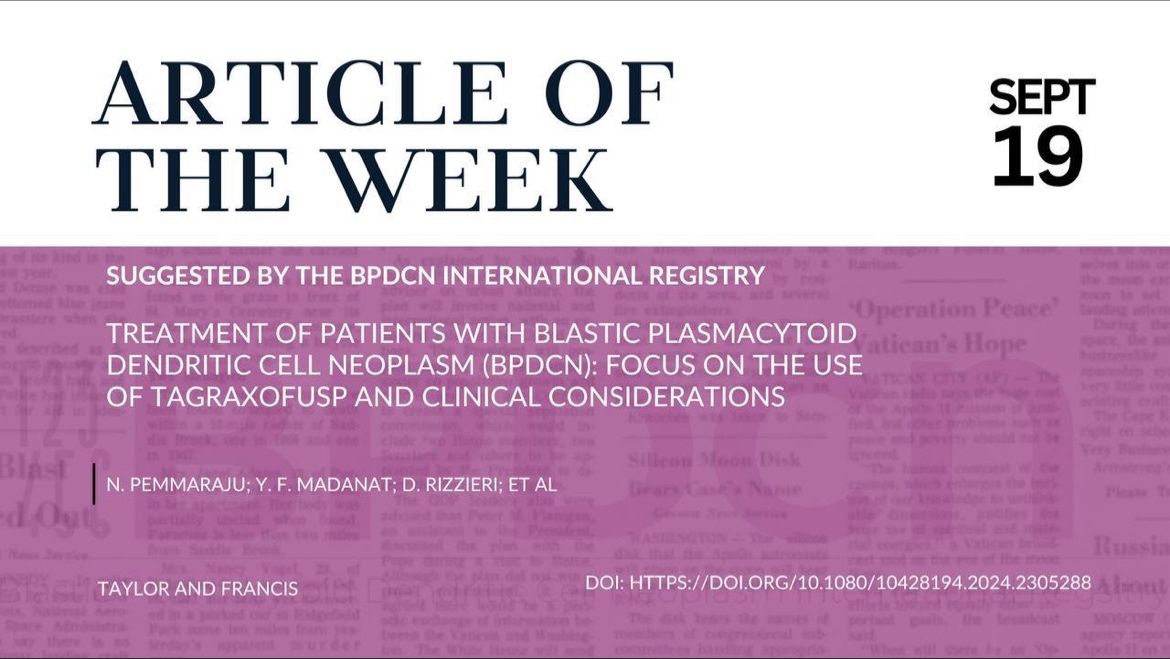Immune Oncology Research Institute shared a post on LinkedIn:
“Article of the Week Suggested by the BPDCN International Registry. Astghik Voskanyan is the Principle Investigator of the BPDCN International Registry.
Blastic plasmacytoid dendritic cell neoplasm (BPDCN) is a rare hematologic malignancy. In 2008, it was recognized by the WHO as a distinct entity and separately listed in the group of acute myeloid leukemias and related precursor neoplasms.
The final diagnosis of BPDCN relies on a compatible immunophenotype. The triple-positive CD4+CD56+CD123+ phenotype associated with negativity for lineage-specific markers is a minimum requirement for defining BPDCN. The highly specific marker BDCA2/CD303, as well as other plasmacytoid dendritic cell-associated antigens (e.g. TCL1 and CD2AP), might be of great support to exclude potential mimickers of BPDCN (acute myeloid and monocytic leukemias, precursor lymphoblastic T-cell leukemia/lymphomas and T- and NK/T cell lymphomas).
At present, there is no consensus on the optimal treatment of BPDCN. The majority of patients receive multi-agent chemotherapy with AML or ALL treatment regimens, while a few patients undergo allogeneic hematopoietic stem cell transplantation (HSCT). Different novel and innovative therapies are in development to target surface molecules in BPDCN. However, patients are still in need of better treatments and the optimal therapy for the disease remains to be determined.
Through this project, we aim to build a large database of patients with BPDCN to investigate the characteristics and outcomes of the disease with different treatment regimens, evaluate prognostic factors, and generate data-based prospective treatment recommendations.
This is a multicenter, international prospective, and retrospective registry. Patients of all sexes and ages who have a diagnosis of BPDCN are eligible for enrolment. Prospective patients must provide informed consent to be eligible to participate. Patients will be recruited directly by national study groups and participating centers.
Prospective participants will be recruited through June 2027. Each participant will be followed-up for 5 years. Retrospective data of patients diagnosed with BPDCN since January 2010 will also be collected.
Authors: Naveen Pemmaraju, Yazan F Madanat, David Rizzieri, Salman Fazal, Raajit Rampal, Gabriel Mannis, Eunice S Wang, James Foran, Andrew A Lane.

Best practices and real-world insights on using the CD123-directed agent TAG as monotherapy for treating BPDCN, approved for patients aged ≥2 years in the US and treatment-naive adults by the EMA. TAG, combined with intrathecal chemotherapy, has shown promising efficacy with manageable safety risks, particularly for CNS involvement, and the most significant adverse effect, capillary leak syndrome (CLS), is generally mild to moderate. TAG offers a predictable safety profile, reduces treatment-related mortality compared to chemotherapy, and can induce complete remission or serve as a long-term treatment option for non-transplantable patients.
Source: Immune Oncology Research Institute/LinkedIn
Immune Oncology Research Institute (IMMONC), established in 2022, is a non-profit, independent, patient-centered research institute. The mission of IMMONC is to advance the cancer knowledge and care through breakthrough scientific research, to integrate innovative immune-oncology therapies into the clinical practice for different types of cancers, to generate and collect clinical data for the identification of new therapeutic targets, developing predictive models and optimizing patient outcomes, to increase the availability and accessibility of those discoveries for the cancer patients, to create a world-class professional environment, to attract the brightest minds in cancer field and to train the next generation researchers.
Other posts featuring Immune Oncology Research Institute on OncoDaily.


